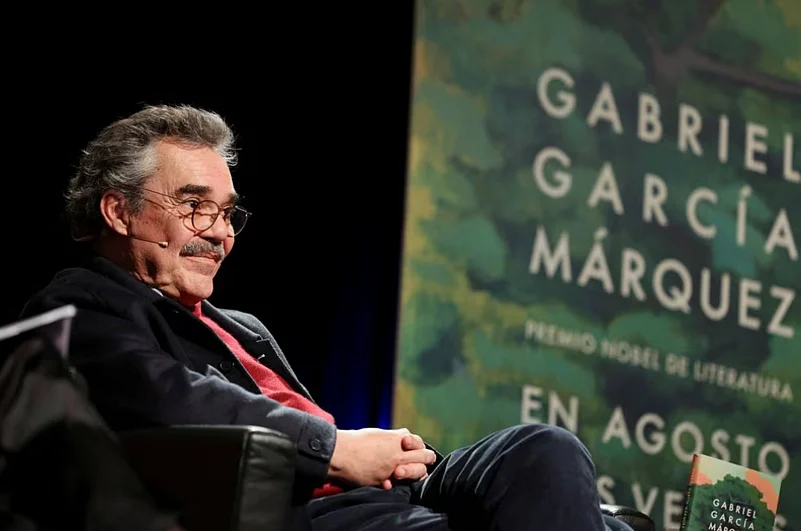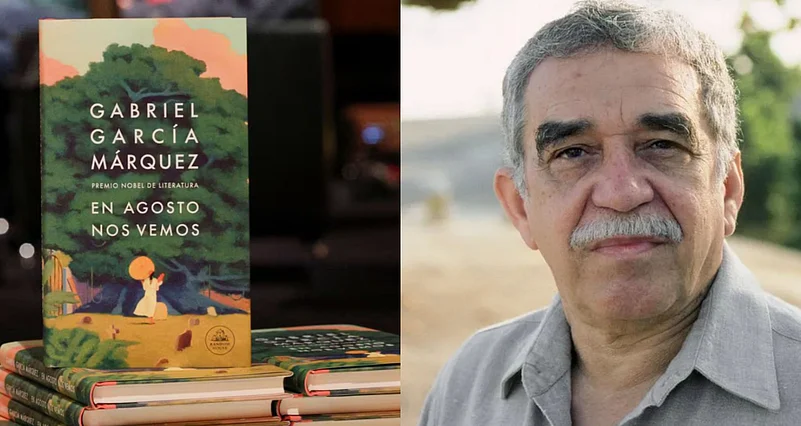Gabriel Garcia Marquez passed away a decade ago, yet a previously unreleased book by the iconic author, known for his contributions to the Latin American "magical realism" genre, is set to be released on Wednesday, somewhat contrary to his desires. During a presentation in Madrid on Tuesday, his sons, Gonzalo and Rodrigo Garcia Barcha, revealed "Until August," a 120-page novel penned by the Colombian Nobel laureate in 2004.
The book is scheduled for release in Spanish on Wednesday, coinciding with Garcia Marquez's birthday, and in English on March 12, as announced by publisher Penguin Random House.
Prior to his passing in 2014 at the age of 87, Garcia Marquez expressed that the book was useless and should be "destroyed."
“He told me directly that the novel had to be destroyed.”
However, his sons and literary agents reviewed the different manuscripts and deemed them to possess a literary significance that may not have been recognized by the author in his final years, which were characterized by memory loss.

At a news conference, Gonzalo Garcia Barcha, using the affectionate name 'Gabo' by which Garcia Marquez was known throughout Latin America, expressed, "For me it means that all of Gabo's work has been published, that nothing is still pending and that in that sense he has closed a cycle."
Garcia Marquez was best known for his novel,"One Hundred Years of Solitude," a mesmerizing, dynastic saga that played a pivotal role in earning him the Nobel Prize for Literature in 1982.

"Until August," set for global release in nearly 30 countries, revolves around a woman named Ana Magdalena Bach, who embarks on an annual pilgrimage to a Caribbean island every August to pay her respects at her mother's grave. During these solemn journeys, momentarily freed from the constraints of her husband and family, she finds solace in the arms of a new lover each time.
Despite being left unfinished by Gabo, his family believes the book retains the author's distinctive and exquisite prose, as well as his profound understanding of the human experience.
Upon García Márquez's passing in 2014, various drafts, notes, and chapter fragments of the novel remained tucked away in his archives at the Harry Ransom Center at the University of Texas at Austin. There, the story lay dormant, spanning 769 pages, largely overlooked and forgotten—until Garcia Marquez's sons made the bold decision to defy their father's wishes.
The novel serves as an unforeseen epilogue to the legacy of García Márquez, a towering figure in literature and a Nobel laureate. Its publication is expected to spark discussions about the ethical dilemmas faced by literary estates and publishers when considering posthumous releases that diverge from an author's explicit instructions.

Other Posthumous Literary Releases
Indeed, literary history is replete with instances where famous works came into existence despite the expressed wishes of the authors.
According to classical lore, on his deathbed, the poet Virgil purportedly requested the destruction of his epic poem "The Aeneid."
Similarly, Franz Kafka, while suffering from tuberculosis, instructed his friend and executor, Max Brod, to burn all of his writings. Brod disregarded Kafka's wishes and instead preserved and published masterpieces such as "The Trial," "The Castle," and "Amerika."
Vladimir Nabokov also left behind instructions for his final novel, "The Original of Laura," to be destroyed, yet more than three decades after his passing, his son chose to release the unfinished manuscript, which Nabokov had outlined on index cards.
These examples raise profound questions about the responsibilities of literary executors and heirs in preserving and disseminating an author's work after their death.
Posthumous Agenzy in Gabriel Garcia Marquez's 'Until August'
In their efforts to construct the most coherent version possible, Pera and the brothers adhered to a strict rule: They would not introduce a single word that did not originate from García Márquez's notes or different versions, they confirmed.
Regarding the fate of any other unpublished works by García Márquez, his sons assert that it's a non-issue: There simply aren't any. Throughout his life, García Márquez routinely disposed of older versions of published books and incomplete manuscripts because he did not want them subjected to scrutiny later on.
This was one of the reasons they chose to publish "Until August," they explained.
“When this book is released, we’ll have all of Gabo’s work published,” García Barcha said. “There is nothing else in the drawer.”



























